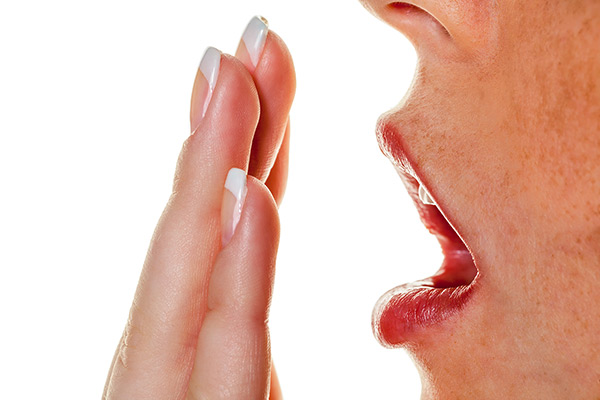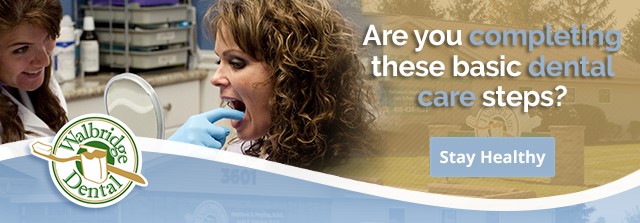It’s embarrassing to find out you have bad breath. The thought of halitosis alone can give some people anxiety. For most, it’s just a temporary problem. However, a few causes of bad breath can be chronic. You can prevent bad breath by avoiding the common causes, as well as taking care of your dental hygiene. Read on as we discuss the causes of halitosis and the best ways to keep your breath fresh.
The Main Cause of Bad Breath is Bacteria
Like most dental issues, the root cause typically leads back to bacteria. The bacteria in your mouth lives and grows from the foods you eat. If you don’t practice excellent dental hygiene, the bacteria will feed on particles of food. They leave behind volatile sulfur compounds (VSCs) as waste. These VSCs are what we typically associate with the “bad breath” smell.
Issues with bad breath are quite common. Up to 50 percent of people admit that they often perceive themselves as having bad breath.
It’s not uncommon for those with persistent bad breath to also have issues with gum disease or tooth decay. When you forego proper brushing, the same bacteria that cause halitosis eventually harden and cause more serious health issues.
Other Causes of Bad Breath
Do you have bad breath? While bacteria are the likely culprit, there are some other possible sources. If you brush and floss regularly, but still have bad breath, it could be one of these other causes:
Foods with Sulfur Compounds
VSCs are common from bacteria, but they can also come directly from the foods you eat. For instance, most people know garlic leaves a strong odor after you eat it – that’s because it’s one of the foods that introduces sulfur compounds to your mouth.
Here are some of the other most common foods that lead to bad breath due to VSCs:
- Onions
- Chives
- Shallows
- Curry
- Leeks
The compounds in these foods are also absorbed into the bloodstream and exhaled through the lungs after digestion. In addition to causing bad breath, it can lead to body odor too!
Illness
It’s also possible for certain illnesses to lead to bad breath:
Pneumonia – When the air sacs in your lungs fill with pus or phlegm, they cause your exhalations to have a bad odor. Other respiratory infections can have similar effects.
Postnasal Drip – The combination of increased mucous with the existing bacteria in your mouth creates an unpleasant odor.
Liver Disease – This serious disease causes toxins to build in the bloodstream. This typically includes ammonia, which has a strong odor.
Kidney Disease – Like liver disease, kidney disease can lead to a buildup of minerals that give your breath an ammonia smell. This is because the kidneys help filter minerals out of your bloodstream; when they fail to function correctly, the minerals enter your bloodstream and cause bad breath along with other serious health issues.
Ketones
Your body typically burns sugars for energy. If you don’t have enough glucose in your body, it automatically shifts to burning fat. When burning fat, your body produces ketones. Fasting or eating a low-carb, high-protein diet are common ways to cause this and introduce large amounts of ketones into your bloodstream.
One ketone is acetone, commonly used in nail polish. When your ketone levels are high, this can lead to a nail polish smell.
For diabetics, extremely high ketone levels are a sign of diabetic ketoacidosis – a dangerous condition that needs immediate medical attention.
Dry Mouth
While dry mouth itself isn’t a cause of bad breath, it leads to ideal conditions for bacteria. Without saliva to help neutralize acids and wash away dead cells, your breath worsens considerably. Causes of dry mouth range from stress to illnesses to even drinking alcohol.
Smoking
Cigarettes are packed with chemicals that can linger in the mouth for a long time after smoking. Smoker’s breath is a unique and noticeable smell. Because of the tar residue, the effects of smoking can continue to impact your breath even with brushing or flossing.
Long-term smokers also tend to have reduced salivation, which leads to dry mouth – another one of the primary causes of bad breath.
How to Prevent Halitosis
#1. Continue Brushing Your Teeth Daily
Prevent halitosis by brushing every day. Every time you brush, you remove bacteria from your teeth. In addition to preventing bad breath, you’ll prevent cavities and gum disease as well.
#2. Don’t Forget to Floss
Your toothbrush can’t hit every surface in your mouth. Particles of food and bacteria can hide between your teeth where even the finest bristles won’t thoroughly clean. Even if you brush every day, you need to floss too – ignoring those small surfaces can still lead to bad breath.
#3. Use Mouth Rinse for a Quick Fix
If you need a fast solution for bad breath, mouth wash can work in a pinch. No mouth rinse will work as a substitute for proper dental hygiene, however. If you aren’t brushing and flossing, mouth rinse will only temporarily mask your breath problems.
Avoid any rinses that contain alcohol. They often cause dry mouth, which can come back to cause more severe halitosis.
#4. Scrape or Brush Your Tongue
You have bacteria on your tongue too! Use a tongue scraper or your regular brush to remove as much of the bacteria as you can. Be gentle, as your tongue is more sensitive than your teeth. Start cleaning from the back and move forward. Don’t forget about the sides!
#5. Avoid Smoking
No matter what you do, smoking will cause issues with bad breath. While you can temporarily mask the smell, long-term smokers will suffer from direct smoking odor, dry mouth issues along with a host of other health problems.
#6. Visit Your Dentist Regularly
Gum disease and other long-term dental health problems can be caught early by your dentist. If you only go when you experience pain or other problems, you risk developing serious dental issues. Schedule your check-ups and don’t miss your appointments. When your overall dental health is kept in check, you’re far less likely to develop chronic halitosis.
Contact Walbridge Dental
We can help make sure you and your family are brushing correctly. If you’re concerned or just looking for information, the professionals at Walbridge Dental provide complete family dental care to families in the Millbury community. Contact us online to set up an appointment now or call us at 419-836-1033.
Connect on Social Media!


